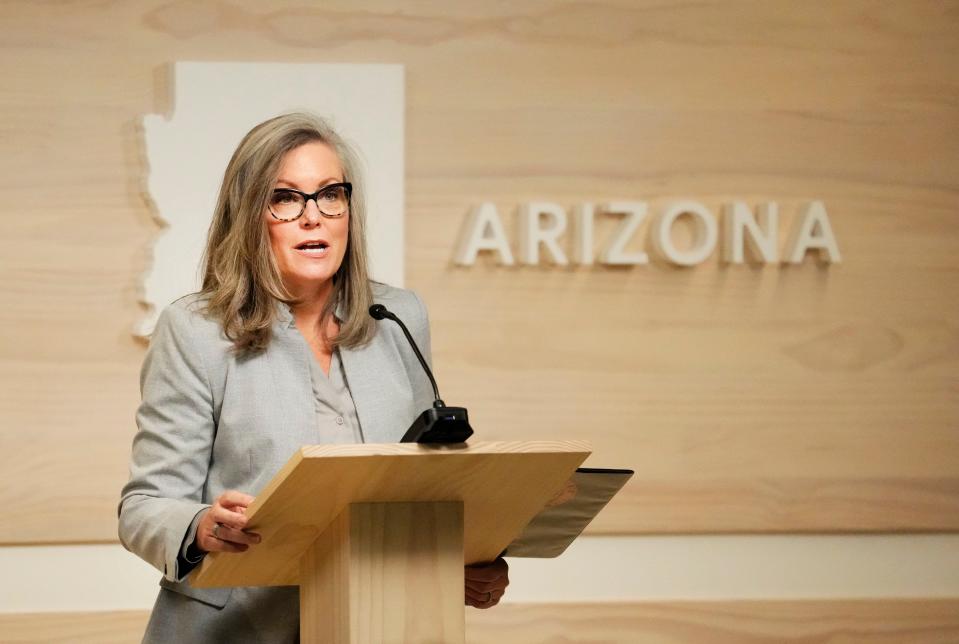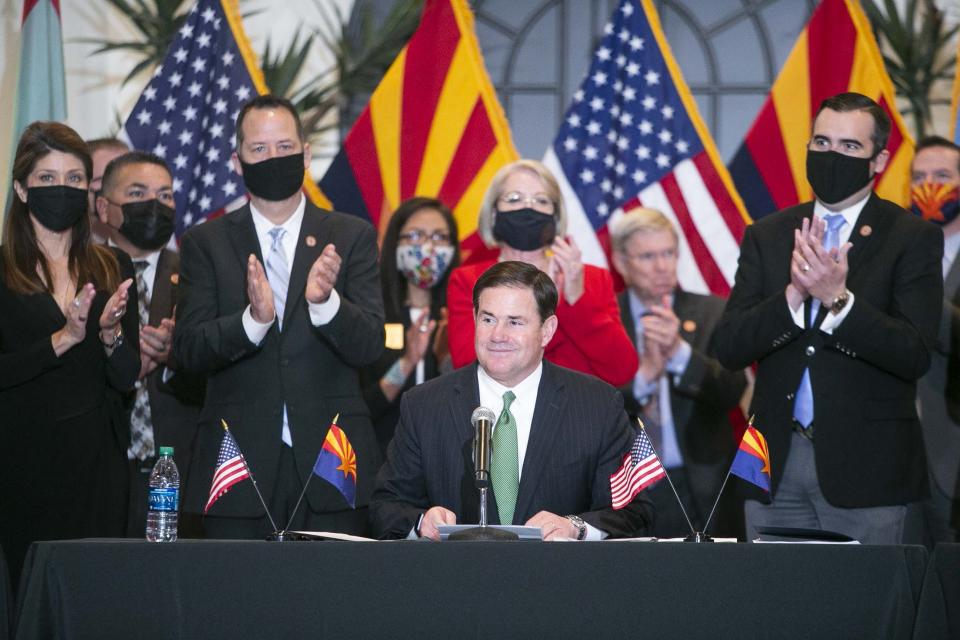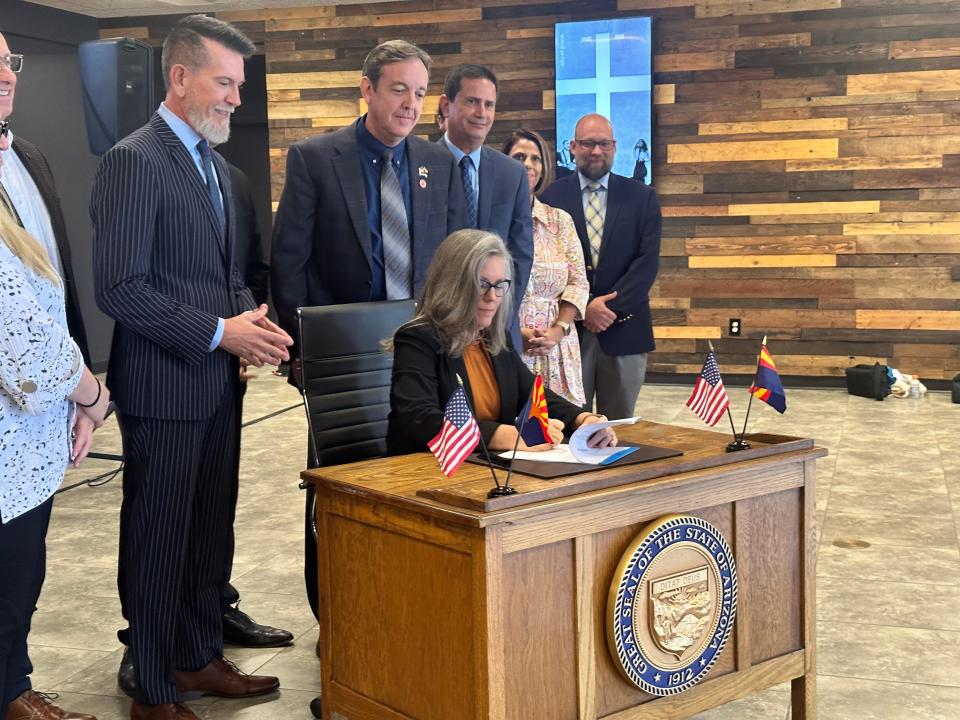Arizona Gov. Hobbs leans on lobbyists in new administration: How does she prevent conflicts?
- Oops!Something went wrong.Please try again later.
- Oops!Something went wrong.Please try again later.
Arizona Gov. Katie Hobbs has hired nine former lobbyists since taking the helm of the state, top advisers whose past clients include the state’s largest teachers’ union and Planned Parenthood.
Hobbs’ transition chief — another lobbyist but who is not on her official payroll — has bent the governor’s ear at least five times during her first six months in office, one time wining and dining and picking up the $136 bill for the governor. Hobbs' chief of staff also attended, with his $136 bill being covered by the lobbyist, too.
As with any new governor who must assemble a team, those confidants’ work histories could raise concerns about conflicts of interest and whether those connections could come before Arizonans’ best interests.
In July, when a controversial company pumping Arizona’s groundwater hired a consultant with close ties to Hobbs, it prompted criticism of what was seen as an attempt to buy access to the most powerful politician in Arizona.
Hobbs has said little about that hire, declining to say whether she saw any ethical issue involved. The consultant quickly backed away from the company after the hire became public.
More on Hobbs: Katie Hobbs' campaign security guard now heads Governor's Office of Highway Safety
The Governor's Office said Hobbs' chief of staff, a longtime Democratic strategist and lobbyist, gave up his former clients when he joined the public payroll in June. His wife, also a lobbyist, represents a major pharmaceutical company that has two state contracts.
Governors, the most powerful politicians in the Grand Canyon State, in recent years have faced scrutiny over their connections to lobbyists and the challenge of avoiding ethical lapses.
Former Gov. Doug Ducey, a Republican, faced criticism that he and his team played favorites with business, often at taxpayer expense.
The Arizona Republic requested to interview Hobbs to learn about her approach and any ethics policies and firewalls she has put in place to prevent violations of state conflict-of-interest laws or situations that might appear to be conflicts.
She declined the request.
Hobbs' office requested questions in writing, most of which it didn’t answer specifically, instead providing a statement from spokesperson Christian Slater.
The statement declared Hobbs’ commitment to transparency and the governor’s view that lobbyists should disclose more about the subjects they lobby on. Though she has supported more disclosure, Hobbs, through her spokesperson, declined to discuss her private meetings with lobbyists.

Hobbs' administration has been criticized, including by Republicans in the state Legislature, for being opaque since its earliest days, when her campaign staff created a fundraising group to pay for the inauguration that could shield the donors, including six-figure contributors like Arizona Public Service.
“The Hobbs administration follows all conflict of interest and ethics laws and goes above and beyond to run a transparent and accessible administration,” Slater said in the statement.
Arizona conflict-of-interest laws
Conflict-of-interest laws and policies exist to build public trust in government and to combat concerns that special interests can hold sway over an elected public official.
Arizona’s law states that “any public officer or employee who has, or whose relative has, a substantial interest in any decision of a public agency shall make known such interest in the official records of such public agency and shall refrain from participating in any manner as an officer or employee in such decision.”
Ducey’s administration was marred by concerns of conflicts. Reporting by The Arizona Republic revealed the former governor directed contracts to law firms that helped boost his campaign coffers and that a Ducey aide spent up to a year working on a tax policy that would benefit her father’s company before disclosing the conflict and stepping aside.

Three experts in government ethics told The Arizona Republic the appearance of a conflict is worth addressing, too, because real and perceived conflicts can have damaging impacts on a reputation.
The experts acknowledged how hard it is to staff an office from the ground up, a process in which governors might hire lobbyists who can bring subject matter expertise, as well as friends or business partners, all of whom can help carry out the governor’s agenda.
“They want to be surrounded by people they can trust, but they also have to, the governors have to, assure the public that those they’ve selected for public offices in the governor’s administration will first and foremost be serving the common good — the public interest — in all that they do,” said John Pelissero, senior scholar in government ethics at the Markkula Center for Applied Ethics at Santa Clara University.
Along with qualifications of a potential hire, governors should also consider ethics and good government issues, said Kristoffer Shields, director of the Eagleton Center on the American Governor at Rutgers University in New Jersey, which studies governors and their roles and powers across the nation.
“You have to think about the way hirings are going to be perceived, because that can sometimes be as important as reality,” Shields said.
What Hobbs’ ethics policy says
After multiple requests, Hobbs’ office provided a copy of an ethics policy it inherited from the Ducey administration and updated in early May. In an ethical area without a lot of guardrails, the policy provides a framework for employees to prevent conflicts.
It urges employees to “avoid even the appearance that you, a relative or a friend profited personally because of your position.”
More on Doug Ducey: US judge blocks 2 Arizona voting laws, saying feds, not state, govern voting rights
“Your actions reflect on the credibility and integrity of the governor and the State of Arizona,” the policy says.
The governor’s policy directs employees not to make personal investments that create a conflict and not to accept any board memberships that conflict with job duties. Board memberships for organizations that receive state funds can be approved by the chief of staff, former Democratic lawmaker and lobbyist Chad Campbell.
As with all state employees, the Governor’s Office staff must fill out a form that asks them to disclose any business interests with the state, any relatives who do business with Arizona, any outside employment, or any state employees who are relatives.
Ethics policies and disclosure requirements vary in each state, and some governors add additional requirements for their top aides.
In California, Democratic Gov. Gavin Newsom’s office provided a policy that requires employees and consultants to file statements of economic interests that report investments, sources of income, and property and business interests.
In Nevada, Republican Gov. Joe Lombardo’s staff follow ethics rules for all state employees that require verbal disclosure of conflicts created because of gifts, loans or personal ties at the time a matter is being considered.
Nevada’s ethics manual requires anyone with a conflict to abstain “only in a clear case where the independence of judgment of a reasonable person in my situation would be materially affected by the conflict just disclosed.” The manual even provides a sample script for someone who has a conflict.

Hobbs' hires have advocated for organizations with missions aligned with the governor’s priorities and her own background before she entered politics when she worked in social services and on behalf of domestic violence victims.
But having a homogenous viewpoint among her advisers can create a risk of ethical issues, said Suzanne Cummins, who taught ethics for more than two decades before retiring from the University of Arizona. She noted that opposing viewpoints can be hard to find, given the polarization of politics today, but said those with different perspectives can help find common ground and flag possible problems early.
“When everybody thinks the same, and in a very advocative way, there is a risk that there's an underlying problem that they will miss and be an ethical problem,” Cummins said.
Lobbyists and the Hobbs administration
Hobbs named a familiar face to take over as her chief of staff in June: Campbell, a former Democratic lawmaker who represented the same Phoenix district as Hobbs when she was in the Legislature.
Campbell came from his lobbying firm Lumen Strategies, where he represented clients including the Arizona Coyotes, energy companies Constellation Energy Generation and NRG Energy, and others.
Campbell affirmed on his disclosure form he had no outside employment or ownership interest in any company with an interest in state business. His form also shows he is married to Courtney McKinstry, a lobbyist on staff for McKesson, the pharmaceutical distribution company. McKesson has two open contracts with the state to provide influenza vaccines and medical supplies. One began in early May, a month before Campbell was hired in the Governor’s Office, and the other has been active since 2020.
After repeated requests, Hobbs’ office provided a June email from Campbell affirming he would have no role in decision-making that could affect his wife’s company.
Other former lobbyists on Hobbs’ staff include her two deputy chiefs of staff, her chief counsel, her chief liaison to the Legislature and at least four policy advisers:
Director of Policy, Legislative and Intergovernmental Affairs Jennifer Loredo: Represented the Arizona Education Association for 18 years before joining the Governor’s Office.
Deputy Chief of Staff for Legislative, Policy and External Affairs Lourdes Peña: Lobbied since 2016 for the firm Triadvocates, which has dozens of clients in business, government and nonprofit sectors.
Deputy Director of Policy and Civil Rights Adviser Whitney Walker: Lobbyist for Planned Parenthood, the Arizona Coalition to End Domestic and Sexual Violence, and Protecting Arizona’s Family Coalition, a group that advocates for health and social service programs, all before joining Hobbs’ campaign for governor.
Health policy adviser Zaida Dedolph Piecoro: Worked for the Arizona Oral Health Care Coalition, Children’s Action Alliance, Wildfire, and the Protecting Arizona’s Family Coalition.
Finance and revenue adviser May Mgbolu: Registered lobbyist on staff at the Children’s Action Alliance and its affiliate Arizona Center for Economic Progress. The center has been a leading voice in opposing the state’s private school voucher program.
Human services adviser Andrew Sugrue: Registered lobbyist on staff at the Children’s Action Alliance and its affiliate Arizona Center for Economic Progress
General Counsel Bo Dul: Registered lobbyist for four years while she worked in the Secretary of State’s Office in roles including as counsel and as elections director.
Deputy Chief of Staff Will Gaona: Previously a lobbyist for the American Civil Liberties Union of Arizona and the Arizona Coalition to End Domestic and Sexual Violence before he went to work for Hobbs in the Secretary of State’s Office in 2019.
Slater, Hobbs’ spokesperson, said Hobbs “hired the best of the best with experience in the public, private, and non-profit sectors to fight on behalf of every Arizonan regardless of political party.”
Opinion piece on Hobbs: Gov. Katie Hobbs' staff scored free Super Bowl tickets? That should rate a penalty
He touted “bipartisan praise” on policy wins, including funding for affordable housing, funding for local public safety measures, and a deal on a bill that will ask Maricopa County residents to extend a transportation tax known as Proposition 400 as evidence of the staff’s success.
He did not answer a question about whether the governor saw value in having a contradictory viewpoint on the team, but noted Hobbs has kept several Ducey appointees who lead state agencies in her Cabinet.
The governor’s inner circle also includes lobbyist Mike Haener, a partner at Willetta Partners, who served as Hobbs’ transition chief in 2022 and when she was elected secretary of state in 2018.
Haener, who is not part of the Hobbs administration, met five times with the governor between February and June, according to reports that lobbyists must file with the secretary of state. All told, the firm paid $277 to pick up the tab for the governor in those meetings. Willetta also reported two meetings with Campbell and two with Billy Kovacs, Hobbs’ federal affairs director.
What do lobbyists have to report?
Lobbyists in Arizona have limited requirements to publicly report information that could help shed light on their activities on behalf of special interests. Four times a year, they report any expenditures over $20 made on behalf of a client or that otherwise benefited a public official, like a state lawmaker or the governor.
They must report their clients, but there is no requirement to reveal what topics, legislation or policies are brought up in a private meeting. There is no requirement to report meetings intended to sway a public official on a particular issue when no expenses are paid.
Lobbying laws vary greatly from state to state, but at least 14 other states require some level of disclosure regarding the subject on which a person is advocating, according to a database of laws compiled by the National Conference of State Legislatures.
Haener told The Republic his meetings with the governor were related to his role in the transition, helping Hobbs nominate people for Cabinet positions and navigate the Senate confirmation process.
That process has taken on an especially partisan tone in the hands of the Republican-majority Senate, which has sent Hobbs back to the drawing board by rejecting several nominees.
Haener said the meetings were publicly reported in the interest of transparency and to ease any concern that their conversations were on behalf of a special interest.
Hobbs’ spokesperson said in the statement the governor supported more reporting requirements for lobbyists.
“As she’s repeatedly stated in the past, Governor Hobbs believes in tougher transparency laws for lobbyists to increase accountability and stop corruption by requiring lobbyists to show all lobbying expenditures from the first dollar spent and require disclosure of the bills and subjects they’re lobbying on more frequently, and improve online access to comprehensive lobbyist filings,” Slater said.
He would not answer a follow-up question asking the Governor’s Office to disclose the subjects of Hobbs’ meetings with Haener.
Reach reporter Stacey Barchenger at stacey.barchenger@arizonarepublic.com or 480-416-5669.
This article originally appeared on Arizona Republic: Hobbs' AZ staff heavy on lobbyists. How she tries to prevent conflicts

